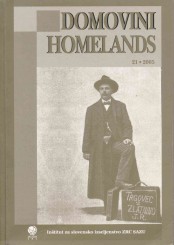SLOVENIAN WOMEN IN GREECE
Keywords:
Migration, Greece, Slovenian women, way of life, customsAbstract
The treatise deals with Slovene women who immigrated to Greece because of marriage. The author attempts to present emigrant women that migrated singly not knowing one of another. The reasons for leaving were entirely personal, that is marriage with a Greek; they were not of political or economic nature. Only those immigrants that moved to Greece and remained there were included in the study. Their initial impressions about Greece were idealistic but as soon as they began living in the new environment, disagreements between the immigrants and the husband’s families arose as well as with the wider Greek environment. Slovene women did not understand their customs and consequently they were not acting in accordance with the rules, and the Greek society did not understand and tolerate their conduct. In Greek society, their status was ambivalent. On the one hand they were critical towards them and therefore rapidly disapproved of their behaviour and on the other Slovene women were allowed a different conduct (more Slovene) or were forgiven and allowed some things because they were strangers. Despite all mentioned Slovene women had to conform to the Greek way of life and to new customs. Some of the customs such as those regarding Easter, social life and food, enriched their style of life while they accepted other habits by necessity; some customs they did not accept and persisted with their own (Slovene) ones. With years, they became similar to the Greeks, absorbed their way of communication, socialising and behaviour, took over some customs yet despite all mentioned distinctions preserved. Different was their style of communication, of conduct as well, and above all the mentality. That connected them with Slovenes and that is why they still feel Slovenes. Slovene women in Greece gradually acquainted with one another. Even a formal society of the Greek-Slovene friendship was established. Meetings were for them a form of sociability and as well of mutual solidarity as they exchanged experiences, had conversations in Slovene language and helped one another. The majority have preserved knowledge of Slovene language as at home they spoke Slovene with their children, some even with their husbands. They preserved contacts with Slovenia – with their families and friends with the help of correspondence and yearly visiting.
Downloads
References
Bečaj, Janez, 1997, Temelji socialnega vplivanja. Ljubljana: Univerza v Ljubljani, Filozofska fakulteta, Oddelek za psihologijo, 329 str.
Bourdieu, Pierre, 2003, Sociologija kot politika. Ljubljana: ‘ Cf, 185 str.
Chom sky, N oam, 1988, Znanje jezika. O naravi, izviru in rabi jezika. Ljubljana: Mladinska knjiga, 287 str.
Dežele in ljudje: Jugozahodna in južna Evropa, 1997, ur. M arjan Krušič. Ljubljana: M ladinska knjiga, 170 str.
D rnovšek, M arjan, 2003, Emigation o f Sloven Women. A Short Historical View. V: Dve dom ovini - Two H om elands 17. Ur. M arjan Drnovšek. Ljubljana 2003, str. 29-46.
Jogan, Maca, 1990, D ružbena konstrukcija hiearhije m ed spoloma. Ljubljana: Fakulteta za sociologijo, politične vede in novinarstvo, 211 str.
Južnič, Stane, 1993, Identiteta. Ljubljana: Fakulteta za družbene vede, 399 str.
Kalc, Aleksej, 2002, Ženske v m anjšinskih skupnostih: Pomen in vloga žensk za o h ranjanje kulturnega izročila, Posvetovanje. V: Dve dom ovini - Two H om elands 16. Ur. Marjan Drnovšek, Ljubljana 2002, str. 143-206.
Klinar, Peter, 1976, M ednarodne migracije: sociološki vidiki mednarodne migracije v luči odnosov med imigrantsko družbo in im igrantskim i skupnostmi. Maribor: Obzorja, 306 str.
Lukšič Hacin, Marina, 1995, Ko tujina postane dom. Ljubljana: Znanstveno publicistično središče, 214 str.
Lukšič Hacin Marina, 2003, Vloga izseljenk za ohranjanje nacionalne identitete v kontekstih, k ijih kostituirajo patriarhalni odnosi in spolna dihotomija. V: Dve domovini - Two H om elans 18. Ur. Marjan Drnovšek, Ljubljana 2003, str. 97-112.
Michener, A ndrew H., John D. DeLamater, 1999, Social Psychology, W iskonsin, Forth Worth: Harcourt Brace College, 631 str.
M očnik, Rastko, 1999, Tri teorije. Ideologija, nacija, institucija. Ljubljana: ‘ Cf, 217 str.
Praprotnik, Tadej, 1999, Ideološki m ehanizmi produkcije identitet. Ljubljana: ISH, 174 str.
Saussure, Ferdinand de, 1997, Predavanja iz splošnega jezikoslovja. Ljubljana: Studia Humanitatis, 304 str.
Slavec G radišnik, Ingrid, 1992, Etnološko proučevanje slovenskih izseljencev. V: Dve dom ovini - Two H om elands 2-3, Ljubljana 1992, str. 309-317.
Šumi, Irena, 2000, K ultura, etničnost, mejnost. Ljubljana: Založba ZRC , Z R C SAZU, ŠOU, 214 str.
Zalokar, Jurij, 1991, M avrična kača. Radovljica: D idakta, 135 str.
Žigon, Zvone, 1998, Otroci dveh domovin: slovenstvo v Južni Ameriki. Ljubljana: Založba ZRC, ZRC SAZU, 269 str.
Downloads
Published
How to Cite
Issue
Section
License

This work is licensed under a Creative Commons Attribution-NonCommercial-NoDerivatives 4.0 International License.
Authors guarantee that the work is their own original creation and does not infringe any statutory or common-law copyright or any proprietary right of any third party. In case of claims by third parties, authors commit their self to defend the interests of the publisher, and shall cover any potential costs.
More in: Submission chapter





